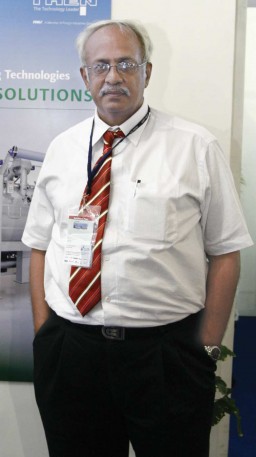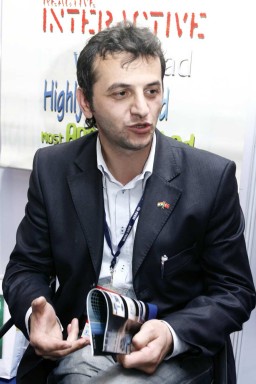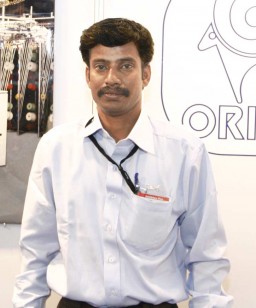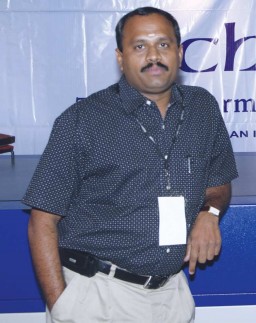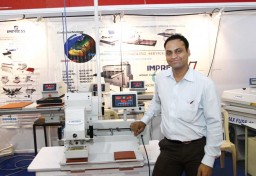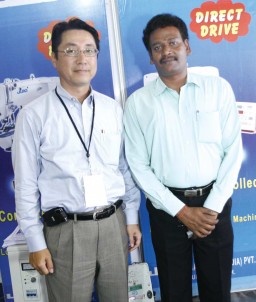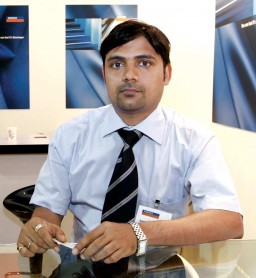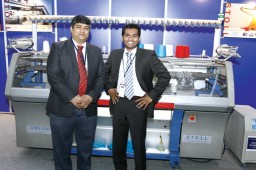
As the industry comes to terms with major slowdown in business and sentiments continue to remain low, Knit-Tech 2009 saw a large turnout of technology suppliers and manufacturers to ‘connect’ with the industry, sending a positive signal that this is indeed the best time to invest.
The atmosphere at the fair was cautious but optimistic with most of the participants having a clear strategy in place for the lean period, which many expect will stretch through the year. Team Apparel Online met some leading players at the four-day event in Tirupur to understand where the optimism is coming from.
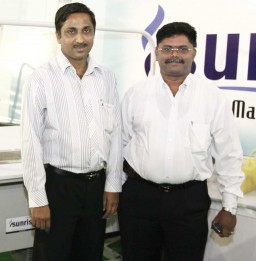
The first thing that hit a visitor to the fair was the attitude of the participants, which unlike in the past was less aggressive on the marketing front and much more focused on educating the industry on why the need to upgrade. “The industry is not interested to invest at this point and it would be counter productive to push. What we can do and are regrouping to do is talk to the industry and suggest ways and means to cut down cost and improve systems to be more competitive,” said Anil Anand, HCA. HCA was at the fair with its Kansai Brand of sewing machines.
Even very high-end IT enabled technology providers like Morgan Tecnica offering CAD/CAM solutions were concentrating on educating the industry and not hard selling. “Many manufacturers in India still do not know the why and how of our sophisticated systems and this is the right time to show them what advantages can be achieved by investing in the high-end technology. It is about winning their confidence at the grassroots with solutions, as awareness increases, sales will follow automatically. We are not in a hurry,” averred D. Anandakumar, ED (Asia Operations), Morgan. The company, which has recently made a top-end cut-plan implementation at Raymonds, is optimistic that the success of the implementation will naturally bring in business from other companies looking at competitive edge.
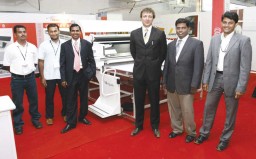
Beating the competition is no doubt top priority for the Tirupur industry as it continues to lose business to immediate neighbour Bangladesh on parameters of price.
“Most of the mass business in knits has been transferred to Bangladesh and the industry is looking at ways to work around the problem. Investing in technology that adds value to the garment so as to move up the value chain is one option,” averred M.P. Selvaraj, Silkart Overseas. The company had on display ultrasonic and hot fix setter for stones, studs, sequin, nail heads, pearls and the like, besides pre-wound embroidery bobbins and decorative items.
Another company with an eye on providing machines for value addition was RVR Polytec. The company had a number of indigenous and patented technologies for the industry like appliqué cutting machine, bobbin-winding machines, and thread winding machines among its other products.
“What the industry needs is solutions that can enhance performance and cut down directly on cost. Our machines are more expensive than similar Chinese machines but the durability and performance is much better. Even today our patented appliqué cutting machine has no competition in the market,” said a proud V. Sriram, MD, RVR Polytec.
Some other companies that were looking to promote products and solutions that add value to the garment include Trims Gallery, Knit Trim, Anil Labels, Dr Aykan, and Arun Electronics to name a few. “It is not only important to have innovative trims and value added solutions but it is also imperative to address changing needs of quality and compliance on parameters of permissible chemical norms, durability and trends,” reasoned Alkesh Vora, Director, Anil Labels that had on display heat transfers made on imported machines that can meet very stringent requirement of the international buyer.
Providing machines that could save cost in the production process was also a strategy for many technology providers. Foo Toon Pow, GM, Focus Garment Tech, Singapore emphasized the increasing demand for ‘cost-effective technology. “Earlier the industry was too busy doing business to listen and think of investing in machines that saved labour cost and energy cost while also improving productivity, but now they are serious and it is reflected in the interest in machines that are geared for the same.” The company with Indian supplier, New Horizon Systems had on display total solutions in garment finishing which according to them could reduce at least 4-5 workers from the system.
Working on productivity with the use of computerized machines and attachments is another area of concentration for the Tirupur industry. “Though we have had computerized sewing machines for a long time, it is only now that the industry is taking real interest. But then again the cost of machine is also a problem so along with our core line we are offering attachments that are cheaper to purchase but can enhance productivity of existing machines,” said Katsumi Nihei, MD, Juki India. He further added, “The focus direction for the company now is to work on labour saving and eco-friendly equipment as buyers are increasingly opting for factories that are cost-effective and is ecologically aware.”
Indeed, the environment is a major concern and many companies that showcased processing technology emphasized the importance. “After carbon footprints, it is water footprints that is a concern and technology in processing that can save on water consumption is the future,” reasoned Kurt Mueller, Area Sales Director, Then Maschinen, Germany, a company that is a leader in airflow technology for fabric processing. In fact, the agents of the technology in India Shri Raaga Tex, had through its principals – Then, Salce and SDLAtlas a complete ecological-friendly solution for processing in the Textile Industry.
While Salce was educating on the importance of having in-house laboratory equipment, SDLAtlas was meeting industry on solutions for material testing. “We are not looking at immediate returns, but at how many people show interest in the concept and what knowledge we can impart on the need to have in-house labs to control quality of dyeing and reduce approval cycles,” averred Renzo Bacchio, Sales Manager, Salce. Added C.S. Ravi, GM, SDLAtlas, “Presence at fairs is currently very important as customers feel reassured that we are with them, it is not about hard core sales.”
Though, presence was a major guiding force for many participants, some had solutions specially designed for the slow down. “We have introduced an economy line that is targeted to be easy on the pocket while giving performance comparable to the best, only certain specialized features have been removed,” informed Rabi Williams, Area Sales Manager, STOLL. The company is looking to enter the Tirupur market with its tested flat-knit technology. “It is not an easy project since Tirupur is comfortable with circular knits and is reluctant to add ‘sweaters’ however fine to its product basket, mostly because of the near absence of skilled work force to link and finish the garment after knitting,” bemoaned R. Saravanan, Director (Sales & Services), STOLL. The technology on display was a time-tested technology and one of the hottest sellers in the world.
Many other companies were displaying tested technology and using the fair as a meeting platform to exchange notes with customers. “Our products and services are well-known, but Tirupur is a growing market for lab facilities, so we are here to hear what the industry is looking for and offer our products and services according to customized needs,” said Sunil Malvankar, Manager Sales, Jay Instruments & Systems (JISL). The company is the supplier for colour matching and dosing systems. Similarly, Benninger with its CDR processing and Orizio with its unique circular knitting machine with electronic double jersey option were content to showcase established technology.
Some players even had new machines on display specifically designed to address long-standing needs of the industry. “We have developed a spot cleaning table with air pressure attachment that is useful for the home furnishing industry. Besides saving time on removing stains, the table will also ensure that no dirt is left unattended as big bulky items like bed linen and curtains can be spread out properly for checking,” said N. Srinivasa, Director, Sunrise. The industry has reacted very positively to the offering.
At the Cheran Machines stall, two new machines designed for the industry based purely on feedbacks were on display. “We have increased the size of the electric dryer for bigger lots and expanded the label transfer to a double table for increased productivity with the use of one machine,” said V. Sudheer Nair, CEO, Cheran Machines.
The company is focused on R&D that is driven by industry requirements. The way forward is to use the slow period to strengthen the product base with machines that are user-friendly and give better productivity.
Perhaps, one of the most innovative machines on display for the first time was the oval screen printing machine at the Dhaval Colour Chem (DCC) stall in association with US-based M&R, pioneers in automatic screen printing machines and accessories. “The unique shape of the machine gives flexibility to add and subtract work stations and print head as per capacity requirement up to 62 stations, it also has the ability to work with up to 58 colours and different applications like flock, foil, glitter, which previously was possible only with digital printing. Also each print head is independent; so as many as desired prints can be done simultaneously,” informed an upbeat Dhaval Dadia, ED, DCC.
A new entrant to the market Dmark Metal Button Company, Hong Kong was displaying ring-snap buttons with fully automatic attaching machine at the Sewing Systems stall. “We are here to feel the water and it is for the first time that we are moving outside our traditional market,” said Micharl Yeung, Sales Director, Global Sourcing Solutions, the marketers of the brand. India is a growth market for them and within a few months time they hope to come in with a splash. “Our product is very good for babies wear as it complies to all regulations of the category and we also guarantee a pulling force strength of 20.2 lbs, which is higher then what other competitors are promising, that too at nearly 40% of the cost,” added Ivan Leung from the company.
It was indeed a positive group of participants and as Srinath Hemmige, Director, Impress concluded, “Interaction between the industry and the technology providers is critical to future growth, as no one can stop India, what is happening is only a speed brake and we must be geared up for tomorrow.”


